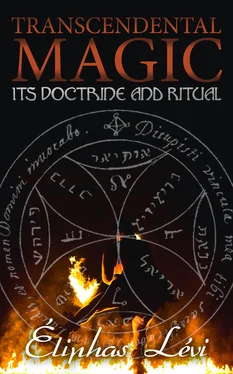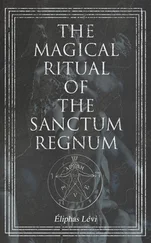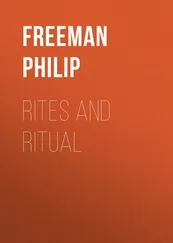The fact has eluded notice, though a distinguished scholar has revealed, not indeed its secret, but its antiquity and singular preservation. Another scholar, but of a mind more fantastic than judicious, passed years in the study of this masterpiece, and has merely suspected its plenary importance. It is, in truth, a monumental and extraordinary work, strong and simple as the architecture of the pyramids, and consequently enduring like those – a book which is the summary of all sciences, which can resolve all problems by its infinite combinations, which speaks by evoking thought, is the inspirer and moderator of all possible conceptions, and the masterpiece perhaps of the human mind. It is to be counted unquestionably among the very great gifts bequeathed to us by antiquity; it is a universal key, the name of which has been explained and comprehended only by the learned William Postel; it is a unique test, whereof the initial characters alone plunged into ecstasy the devout spirit of Saint-Martin, and might have restored reason to the sublime and unfortunate Swedenborg. We shall recur to this book later on, for its mathematical and precise explanation will be the complement and crown of our conscientious undertaking.
The original alliance between Christianity and the Science of the Magi, once demonstrated fully, will be a discovery of no second-rate importance, and we do not doubt that the serious study of Magic and the Kabalah will lead earnest minds to a reconciliation of science and dogma, of reason and faith, heretofore regarded as impossible.
We have said that the Church, whose special office is the custody of the Keys, does not pretend to possess those of the Apocalypse or of Ezekiel. In the opinion of Christians the scientific and magical Clavicles of Solomon are lost, which notwithstanding, it is certain that, in the domain of intelligence, ruled by the Word nothing that has been written can perish. Whatsoever men cease to understand exists for them no longer, at least in the order of the Word, and it passes then into the domain of enigma and mystery. Furthermore, the antipathy and even open war of the Official Church against all that belongs to the realm of Magic, which is a kind of personal and emancipated priesthood, is allied with necessary and even with inherent causes in the social and hierarchic constitution of Christian sacerdotal-ism. The Church ignores Magic – for she must either ignore it or perish, as we shall prove later on; yet she does not recognize the less that her mysterious Founder was saluted in His cradle by Three Magi – that is to say, by the hieratic ambassadors of the three parts of the known world and the three analogical worlds of occult philosophy. In the School of Alexandria, Magic and Christianity almost joined hands under the auspices of Ammonius Saccas and of Plato; the doctrine of Hermes is found almost in its entirety in the writings attributed to Dionysius the Areopagite; Synesius outlined the plan of a treatise on dreams, which was annotated subsequently by Cardan, and composed hymns that might have served for the liturgy of the Church of Swedenborg, could a church of the illuminated possess a liturgy. With this period of fiery abstractions and impassioned warfare of words there must be connected also the philosophic reign of Julian, called the Apostate because in his youth he made unwilling profession of Christianity. Everyone is aware that Julian had the misfortune to be a hero out of season of Plutarch, and that he was, if one may say so, the Don Quixote of roman Chivalry; but what most people do not know is that he was one of the illuminated and an initiate of the first order: that he believed in the unity of God and in the universal doctrine of the Trinity; that, in a word, he regretted nothing of the old world but its magnificent symbols and its too gracious images. Julian was not a pagan; he was a Gnostic allured by the allegories of Greek polytheism, who had the misfortune to find the name of Jesus Christ less sonorous than that of Orpheus. The Emperor paid in his person for the academical tastes of the philosopher and rhetorician, and after affording himself the spectacle and satisfaction of expiring like Epaminondas with the periods of Cato, he had in public opinion, by this time fully Christianized, but anathemas for his funeral oration and a scornful epithet for his ultimate memorial.
Let us pass over the petty minds and small matters of the Bas-Empire, and proceed to the Middle Ages . . . . Stay, take this book! Glance at the seventh page, then seat yourself on the mantle which I am spreading, and let each of us cover our eyes with one of its corners . . . . Your head swims, does it not, and the earth seems to fly beneath your feet? Hold tightly, and do not look right or left . . . .
The vertigo ceases: we are here. Stand up and open your eyes, but take care before all things to make no Christian sign and to pronounce no Christian words.
We are in a landscape of Salvator Rosa, a troubled wilderness which seems resting after a storm. There is no moon in the sky, but you can distinguish little stars gleaming in the brushwood, and may hear about you the slow flight of great birds, which seem to whisper strange oracles as they pass. Let us approach silently that crossroad among the rocks. A harsh, funereal trumpet winds suddenly, and black torches flare up on every side. A tumultuous throng is surging round a vacant throne: all watch and wait. Suddenly they cast themselves on the ground. A goat-headed prince bounds forward among them; he ascends the throne, turns, and assuming a stooping posture, presents to the assembly a human face, which everyone comes forward to salute and to kiss, their black taper in their hands. With a hoarse laugh he recovers an upright position, and then distributes gold, secret instructions, occult medicines and poisons to his faithful bondsmen. Meanwhile, fires are lighted of fern and alder, piled up with human bones and the fat of executed criminals. Druidesses, crowned with wild parsley and vervain, immolate unbaptized children with golden knives and prepare horrible love-feasts. Tables are spread, masked men seat themselves by half-nude females, and a Bacchanalian orgy begins; there is nothing wanting but salt, the symbol of wisdom and immortality. Wine flows in streams, leaving stains like blood; obscene advances and abandoned caresses begin. A little while, and the whole assembly is beside itself with drink and wantonness, with crimes and singing. They rise, a disordered throng, and form infernal dances . . . . Then come all legendary monsters, all phantoms of nightmare; enormous toads play inverted flutes and thump with paws on flanks; limping scarabaei mingle in the dance; crabs play the castanets; crocodiles beat time on their scales; elephants and mam-moths appear habited like Cupids and foot it in the ring: finally, the giddy circles break up and scatter on all sides . . . . Every yelling dancer drags away a dishevelled female . . . . Lamps and candles formed of human fat go out smoking in the darkness . . . . Cries are heard here and there, mingled with peals of laughter, blasphemies and rattlings in the throat. Come, rouse yourself: do not make the sign of the cross! See, I have brought you home. You are in your bed, not a little worn out, possibly a trifle shattered, by your night's journey and its orgy; but you have beheld that of which everyone talks without knowledge; you have been initiated into secrets no less terrible than the grotto of Triphonius; you have been present at the Sabbath. It remains for you now to preserve your wits, to have a wholesome dread of the law, and to keep at a respectful distance from the Church and her faggots.
Would you care, as a change, to behold something less fantastic, more real and also more truly terrible? You shall assist at the execution of Jacques de Molay and his accomplices or his brethren in martyrdom . . . . Be not misled, however; confuse not the guilty and the innocent! Did the Templars really adore Baphomet?
Читать дальше












